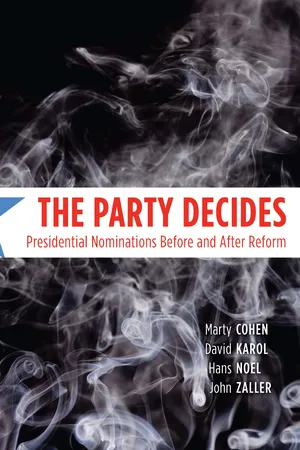
eBook - PDF
The Party Decides
Presidential Nominations Before and After Reform
- English
- PDF
- Available on iOS & Android
eBook - PDF
The Party Decides
Presidential Nominations Before and After Reform
About this book
Throughout the contest for the 2008 Democratic presidential nomination, politicians and voters alike worried that the outcome might depend on the preferences of unelected superdelegates. This concern threw into relief the prevailing notion that—such unusually competitive cases notwithstanding—people, rather than parties, should and do control presidential nominations. But for the past several decades, The Party Decides shows, unelected insiders in both major parties have effectively selected candidates long before citizens reached the ballot box.
Tracing the evolution of presidential nominations since the 1790s, this volume demonstrates how party insiders have sought since America's founding to control nominations as a means of getting what they want from government. Contrary to the common view that the party reforms of the 1970s gave voters more power, the authors contend that the most consequential contests remain the candidates' fights for prominent endorsements and the support of various interest groups and state party leaders. These invisible primaries produce frontrunners long before most voters start paying attention, profoundly influencing final election outcomes and investing parties with far more nominating power than is generally recognized.
Tracing the evolution of presidential nominations since the 1790s, this volume demonstrates how party insiders have sought since America's founding to control nominations as a means of getting what they want from government. Contrary to the common view that the party reforms of the 1970s gave voters more power, the authors contend that the most consequential contests remain the candidates' fights for prominent endorsements and the support of various interest groups and state party leaders. These invisible primaries produce frontrunners long before most voters start paying attention, profoundly influencing final election outcomes and investing parties with far more nominating power than is generally recognized.
Frequently asked questions
Yes, you can cancel anytime from the Subscription tab in your account settings on the Perlego website. Your subscription will stay active until the end of your current billing period. Learn how to cancel your subscription.
No, books cannot be downloaded as external files, such as PDFs, for use outside of Perlego. However, you can download books within the Perlego app for offline reading on mobile or tablet. Learn more here.
Perlego offers two plans: Essential and Complete
- Essential is ideal for learners and professionals who enjoy exploring a wide range of subjects. Access the Essential Library with 800,000+ trusted titles and best-sellers across business, personal growth, and the humanities. Includes unlimited reading time and Standard Read Aloud voice.
- Complete: Perfect for advanced learners and researchers needing full, unrestricted access. Unlock 1.4M+ books across hundreds of subjects, including academic and specialized titles. The Complete Plan also includes advanced features like Premium Read Aloud and Research Assistant.
We are an online textbook subscription service, where you can get access to an entire online library for less than the price of a single book per month. With over 1 million books across 1000+ topics, we’ve got you covered! Learn more here.
Look out for the read-aloud symbol on your next book to see if you can listen to it. The read-aloud tool reads text aloud for you, highlighting the text as it is being read. You can pause it, speed it up and slow it down. Learn more here.
Yes! You can use the Perlego app on both iOS or Android devices to read anytime, anywhere — even offline. Perfect for commutes or when you’re on the go.
Please note we cannot support devices running on iOS 13 and Android 7 or earlier. Learn more about using the app.
Please note we cannot support devices running on iOS 13 and Android 7 or earlier. Learn more about using the app.
Yes, you can access The Party Decides by Marty Cohen,David Karol,Hans Noel,John Zaller in PDF and/or ePUB format, as well as other popular books in Politics & International Relations & North American History. We have over one million books available in our catalogue for you to explore.
Information
Publisher
University of Chicago PressYear
2009Print ISBN
9780226112374, 9780226112367eBook ISBN
9780226112381
Whose
Parties?
45
be
more
like
Chase
than
like
Wallace,
which
means
most
will
have
a
dual
status
as
officeholder
and
policy
demander.
H
H
H
We
turn
now
to
the
historical
and
contemporary
record
of
party
formation,
party
change,
and
presidential
nominations
to
conduct
our
four
tests.
We
begin
in
the
next
chapter
with
the
founding
period
of
four
major
Ameri-
can
parties,
all
from
the
late
eighteenth
and
early
nineteenth
centuries.
The
reason
we
go
so
far
back
in
history
is
that
our
country’s
most
important
parties
were
founded
in
this
period.
In
our
reading
of
the
historical
record,
groups
of
intense
policy
demanders
were
major
influences
in
the
found-
ing
of
all
four
parties
and
dominant
in
at
least
three
of
the
four.
Most
of-
ficeholders
simply
watched—albeit,
with
great
interest—as
groups
did
the
main
work
of
organizing
new
parties.

Table of contents
- Contents
- Acknowledgments
- 1 The Outrageous Nomination of Hubert Humphrey
- 2 Whose Parties?
- 3 The Creation of New Parties
- 4 Weak Structures, Strong Parties
- 5 Last Hurrahs of the Old System
- 6 Mastering the Postreform System
- 7 The Invisible Primary: Theory and Evidence
- 8 Anatomy of a Conversation
- 9 The Voters Weigh In
- 10 Political Parties Today
- Notes
- References
- Index